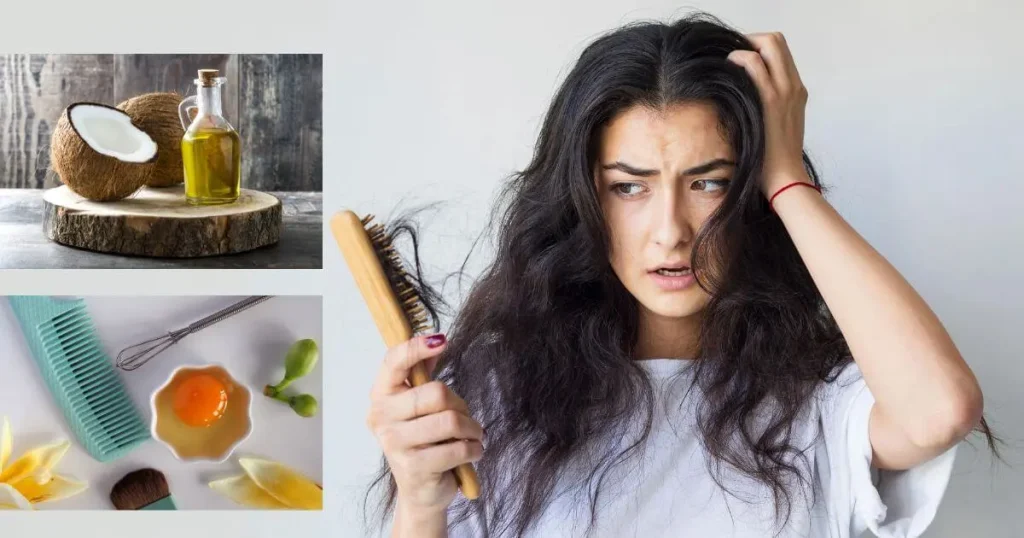Experiencing hair breakage can be disheartening, especially when aiming for a luscious, full head of hair. However, the answer to preventing hair breakage may differ from expensive salon treatments or over-the-counter products filled with complex chemicals. Instead, the key to stronger, healthier hair might be the simplicity of natural remedies and holistic lifestyle changes. This blog post is dedicated to the natural hair community, beauty enthusiasts, and anyone seeking to stop hair breakage naturally.
In this post, we’ll dig into the root causes of hair breakage, unveil natural remedies that can strengthen your strands, and explore lifestyle changes that nourish your hair from the inside out. It’s time to say goodbye to brittle hair and hello to a stronger, more vibrant mane as resilient as beautiful.
Understanding Hair Breakage
Hair breakage is the bane of many women and men seeking to maintain luscious locks. It occurs when the hair shaft weakens, breaking off at the scalp or mid-length. Though hair is a natural process to shed, excessive breakage can lead to noticeable thinning and reduced hair volume. Identifying the causes of hair breakage is crucial to reversing and preventing the problem.
Over styling
The modern trend of ‘more is more’ has pushed our hairstyling methods to the limit. Daily heat styling, coloring, and perming can strip hair of its natural oils, leaving it brittle and prone to breakage.
Tight Hairstyles
For many, tight ponytails or braids are a go-to style for their practicality. Still, over time, the constant tension on the strands can cause traction alopecia, where breakage occurs at the hairline due to persistent strain.
Chemical Treatments
While there’s no denying the allure of a fresh set of highlights or a luscious hair straightening, the chemical compounds used in these treatments can wreak havoc on hair health and structure, leading to weakness and breakage.
Lack of Moisture
One of the leading causes of hair breakage is a lack of moisture. This can result from environmental factors, like excessive sun exposure or your shampooing regimen. Certain shampoos can strip your hair of natural oils, leading to dryness and vulnerability.
Nutritional Deficiencies
Your hair is an outward sign of your internal health. A balanced diet supplies the nutrients essential for hair strength and elasticity. Lack of protein, vitamins, and fatty acids can lead to brittle and weak hair prone to breakage.
Stress
Yes, stress can snatch a handful of hair from your scalp. High-stress levels can lead to a condition known as telogen effluvium, causing more hairs than usual to move into the shedding phase, which can include breakages.
Remedies to Stop Hair Breakage Naturally
The beauty of natural remedies lies in their gentle yet effective approach to nourishing the hair from root to tip. The following natural remedies are renowned for their ability to combat hair breakage:
1. Coconut Oil
Coconut oil is a tried and trustworthy ally in the battle against hair breakage. Rich in lauric acid, it has a high affinity for hair proteins, penetrating the hair shaft, preventing protein loss, and restoring strength and flexibility.
To use coconut oil for hair breakage:
- Warm the oil between your hands and massage it into your scalp and hair.
- Please leave it in for at least 30 minutes, or preferably overnight.
- Wash it out with a mild shampoo.
2. Aloe Vera
Aloe vera is not only a go-to for sunburns; its conditioning properties can also do wonders for damaged hair. The proteolytic enzymes in aloe vera help repair dead skin cells on the scalp, promoting healthy hair growth.
Application tips
- Apply aloe vera gel directly to the scalp and hair.
- Massage it for a few minutes and leave for 30 minutes before rinsing.
3. Egg Mask
Eggs are packed with protein, which is essential for repairing hair damage. An egg mask can prevent breakage and make your hair appear shinier and healthier.
Here’s a simple egg mask recipe:
- Beat one or two eggs, depending on the length and thickness of your hair.
- Apply the egg to your hair and scalp and massage it in.
- Leave it on for 30 minutes, then rinse with cool water and mild shampoo.
4. Avocado Mask
An avocado hair mask is like a green smoothie for your strands. Avocados are rich in vitamin E, which promotes hair growth, and healthy fats that provide moisture and nourishment.
To make the mask:
- Mix a ripe avocado with a tablespoon of olive oil until you have a creamy consistency.
- Apply the mask to your hair, concentrating on the ends where breakage is most common.
- Leave it on for 20-30 minutes, then rinse thoroughly with lukewarm water.
5. Castor Oil
Castor oil is a thick, viscous oil that packs a punch against hair breakage. It is rich in ricinoleic acid, which improves blood circulation to the scalp and aids in transporting essential nutrients to the hair’s terminal, thus promoting hair growth and minimizing breakage.
For a castor oil treatment:
- Warm the oil slightly and apply it to your hair and scalp.
- Gently massage your scalp for a few minutes to ensure the oil is evenly distributed and the blood flow to your hair follicles is increased.
- Leave the oil in for at least an hour or overnight, then wash your hair as usual.
6. Green Tea
Green tea has many health benefits, and hair health is no exception. The antioxidant properties help to tackle free radicals that can weaken the hair. At the same time, the caffeine in green tea is believed to block DHT, a hormone linked to hair loss.
To use green tea for stronger hair:
- Brew a cup of green tea and allow it to cool.
- Pour the tea over your hair and scalp after you’ve shampooed.
- Leave it on for 10 minutes, then rinse thoroughly with cold water.
7. Apple Cider Vinegar Rinse for pH Balance
An apple cider vinegar (ACV) rinse helps smooth the hair cuticle, strengthening the hair and reducing split ends, ultimately lowering your risk of breakage. Here’s a simple guide to making the rinse:
Ingredients
- 1 part apple cider vinegar
- Three parts water
- A few drops of your favorite essential oil (optional)
Method
- Mix the ingredients in a cup.
- Shampoo your hair as usual, then pour the apple cider vinegar rinse over your hair, ensuring even coverage.
- Please leave it in for one to two minutes and then rinse thoroughly.
Incorporate this rinse into your hair care routine once or twice a week for best results.
Oiling and Massaging Techniques
Simply applying oil to your hair isn’t enough; how you do it matters. The ancient practice of head massage, Champissage, distributes oil throughout your hair, stimulates the scalp, and increases blood flow.
Proper Oil Application:
- Section your hair and apply the oil, starting from the scalp and working through to the ends.
- Use your fingertips to massage the oil into your scalp with circular motions.
- Comb the oil through your hair with a wide-tooth comb to ensure even distribution.
- Please leave it in for several hours or overnight for the best results.
Nutritional Tips for Healthier Hair
Your diet plays a significant role in the health of your hair. Consuming the proper nutrients can directly impact hair strength and growth.
Vitamins
- Biotin (Vitamin B7) is crucial for maintaining healthy hair; deficiencies can lead to hair loss and breakage.
- Vitamin E acts as an antioxidant and reduces oxidative stress on the scalp.
Minerals
- Iron helps red blood cells carry oxygen to cells, including hair follicles, stimulating growth and repair.
- Zinc assists in cell reproduction, hormonal balance, and absorption of other vitamins, all vital elements for healthy hair.
Lifestyle Changes for Stronger Hair
The health of your hair is often a reflection of your overall health and well-being. Making positive lifestyle changes can contribute to more robust, more resilient hair.
Stress Management
Stress can lead to Telogen Effluvium, where more hair follicles can enter the resting phase, leading to temporary hair loss and breakage. Stress-reducing activities such as meditation, exercise, and time in nature can help manage this.
Proper Hair Care Routines
Overwashing, harsh shampoos, and neglecting conditioning can strip hair of natural oils, leading to dryness and breakage. Opt for gentle sulfate-free shampoos on hair and use a hydrating conditioner to maintain moisture balance.
Importance of Hydration and Diet
Dehydration directly impacts hair health, as the hair shaft is comprised of 1/4 water. Ensure you drink enough water and consume a balanced diet of fruits, vegetables, and proteins.
Your hair’s vitality is within your control, and by incorporating these natural remedies into your routine, you can fortify it against the daily challenges it faces. Combine them with a healthy lifestyle, and you’ll be well on your way to stopping hair breakage and promoting the growth of a solid and beautiful mane.
Final Thoughts – How to Stop Hair Breakage Naturally
Hair breakage is a common concern, but it’s a battle that can be won naturally with the right approach. You can achieve the robust and beautiful hair you desire by understanding the causes of breakage and following a comprehensive plan that includes natural remedies and lifestyle adjustments. The road to stronger hair may begin in your kitchen with pantry staples like avocados and apple cider vinegar. By taking a holistic approach, you’ll notice a transformation in your hair’s health and enhance your overall wellness. Say goodbye to breakage and hello to your best hair days yet.
Frequently Asked Questions
What causes hair breakage?
Hair breakage can be caused by various factors such as excessive heat styling, harsh hair products, lack of moisture, nutritional deficiencies, and over-manipulation of hair.
How can I stop hair breakage naturally?
You can stop hair breakage naturally by using gentle hair care products, avoiding excessive heat styling, incorporating a healthy diet rich in vitamins and minerals, keeping your hair well-moisturized, and minimizing the use of tight hairstyles.
What are some natural remedies for hair breakage?
Natural remedies for hair breakage include using coconut oil, egg mask, castor oil, aloe vera gel, and avocado masks to moisturize and nourish your hair. Additionally, incorporating a balanced diet with plenty of fruits, vegetables, and proteins can promote healthy hair growth.
Is it important to trim my hair regularly to prevent breakage?
Yes, regular trims are important to prevent split ends and breakage. Trimming every 6-8 weeks can help maintain the health of your hair and prevent breakage from spreading.
Are there specific hairstyles that can help prevent hair breakage?
Opting for protective hairstyles such as braids, twists, buns, and loose hairstyles can help minimize hair breakage by reducing friction and tension on the hair strands.
Can stress contribute to hair breakage?
Yes, stress can contribute to hair breakage as it can disrupt the hair growth cycle and lead to increased shedding. Managing stress through relaxation techniques, exercise, and adequate sleep can help promote healthier hair.
Should I avoid using heat styling tools to prevent hair breakage? Limiting the use of heat styling tools such as flat irons, curling irons, and blow dryers can help prevent hair breakage. If you must use heat, always use a heat protectant spray and avoid high temperatures.
- How to Use Aloe Vera for Acne: A Comprehensive Guide - June 1, 2024
- Jojoba Oil for Hair: How to Use for Maximum Benefits - May 19, 2024
- 8 Benefits of Jojoba Oil for Skin: The Ultimate Guide - May 18, 2024



